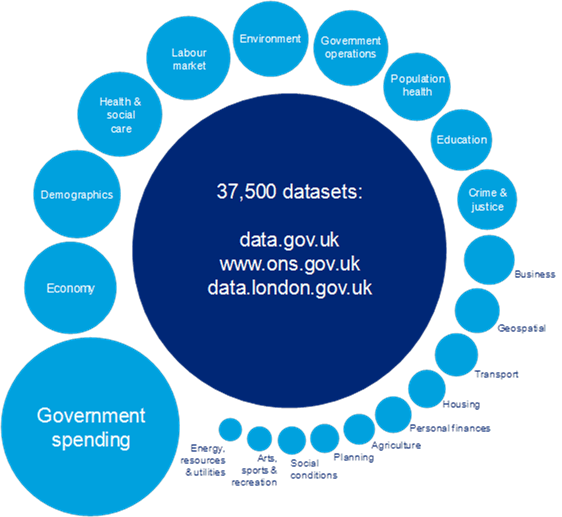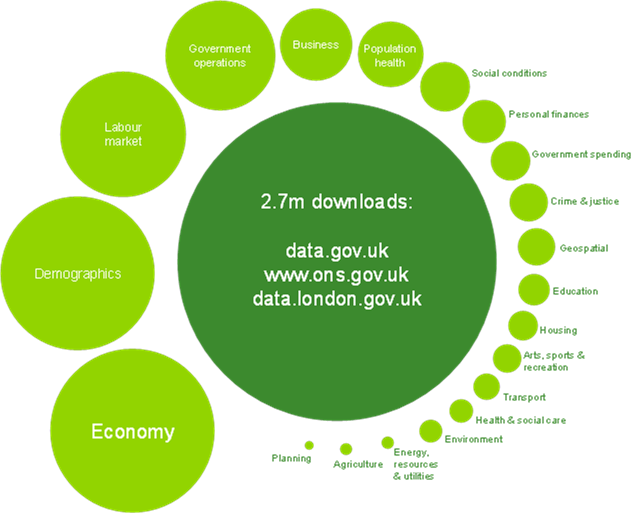Open growth
Data has been variously described as the new oil or the new raw material of the 21st century. Like other raw materials, its value is not always immediately evident – specialist tools and effort are required to locate, extract and refine data before it yields actionable information. And, unlike natural raw materials, data is not diminished when it is consumed. This is why the data that governments and public sector bodies have worked so hard to collect and publish under open licences is of such value. It represents a vast resource that can be tapped freely, time and time again by organisations and citizens alike, whether this is to understand the inner workings of government, learn about issues affecting local communities or to enable new business start-ups. Across the world, hundreds of thousands of different data sets have been made available on official open data portals. For instance, data.gov, the national US portal, lists nearly 380,000 data sets; and the French national portal, data.gouv.fr, lists over 350,000. In the UK, the three largest open data portals, data.gov.uk, http://www.ons.gov.uk and data.london.gov.uk, link to over 37,000 unique data sets between them, covering categories ranging from government spending to energyEnsuring universal access to sustainable, dependable, and affordable energy is critical to every aspect of prosperity. Increasing public oversight and transparency in the energy sector can help to ens... More consumption. [See figure 1]
However, transparencyAccording to OGP’s Articles of Governance, transparency occurs when “government-held information (including on activities and decisions) is open, comprehensive, timely, freely available to the pub... More isn’t achieved simply by the act of publishing data; nor can businesses benefit solely from the large quantities of open dataBy opening up data and making it sharable and reusable, governments can enable informed debate, better decision making, and the development of innovative new services. Technical specifications: Polici... that government supplies. Instead, social or economic value derives from data being put to use – by concerned citizens and entrepreneurial businesses. Unfortunately, with demand-side initiatives for open data so nascent, the quantitative evidence needed to demonstrate the economic value is not yet available. In the UK, for instance, the most popular types of data, which include economic, demographic, labour market and government operations data, cannot readily be used by businesses in all sectors of the economy. [See figure 2]
Nevertheless, new businesses and new business models are beginning to emerge: Suppliers, aggregators, developers, enrichers and enablers. Working with the Open Data Institute, Deloitte has been investigating the demand for open data from businesses. Looking at the actual supply of and demand for open data in the UK provides some indication of the breadth of sectors the data is relevant to and the scale of data they could be considering.
The research suggests that the key link in the value chain for open data is the consumer (or the citizen). On balance, consumer-driven sectors of the economy will benefit most from open government data that has direct relevanceAccording to the OGP Articles of Governance, OGP commitments should include a clear open government lens. Specifically, they should advance at least one of the OGP values: transparency, citizen partic... to the choices individuals make as part of their day-to-day lives.
It is apparent from the available evidence that the open data initiative in the UK has started well. The quantity and breadth of open government data being made available for businesses to use is increasing rapidly. And interest in and demand for the data is on the rise. While opportunities remain to further increase the potential and use of open data in certain sectors, the journey to realising economic benefit is only just beginning.
—————————-
This communication contains general information only and is not intended to be comprehensive or to provide professional or investment advice. It is not a substitute for such professional advice and should not be relied upon or used as a basis for any decision or action that may affect you or your business. This briefing is not directed to, or intended for distribution or use in, any jurisdiction where such distribution or use would be prohibited. To the extent permitted by law, Deloitte LLP accepts no duty of care or liability for any loss occasioned to any person acting or refraining from acting as a result of any material in this communication. This communication is from Deloitte LLP, a limited liability partnership registered in England and Wales with registered number OC303675. Its registered office is 2, New Street Square, London EC4A 3BZ, United Kingdom. Deloitte LLP is the United Kingdom member firm of Deloitte Touche Tohmatsu Limited (‘DTTL’), a UK private company limited by guarantee, whose member firms are legally separate and independent entities. Please see http://www.deloitte.co.uk/about for a detailed description of the legal structure of DTTL and its member firms. Opinions, conclusions and other information in this communication which have not been delivered by way of the business of Deloitte LLP are neither given nor endorsed by it. © 2013 Deloitte LLP. All rights reserved.

 Fig.1 source: data.gov.uk,
Fig.1 source: data.gov.uk,  Fig 2. source: data.gov.uk,
Fig 2. source: data.gov.uk,